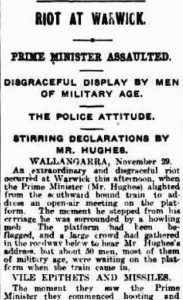On 29 April 2021 I gave a talk to the National Maritime Museum of Ireland entitled ‘A Victory Comparable to Jutland: the Royal Navy’s Hijacking of Archbishop Daniel Mannix in 1920’. The talk was recorded and is available for viewing at the museum’s website or directly through YouTube
Here is the description of the talk: On 8 August 1920 the Catholic Archbishop of Melbourne, Cork-born Daniel Mannix, was travelling from New York to Queenstown aboard the SS Baltic when he was arrested off the coast of Ireland by the Royal Navy and transferred to a destroyer, HMS Wivern, which landed him at Penzance in England.… Read the rest

